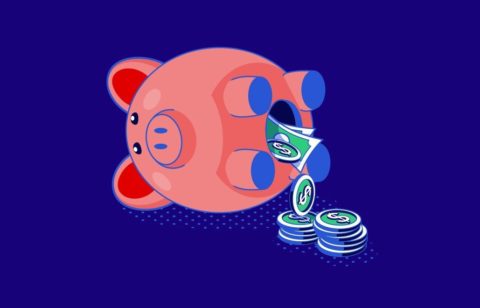Debt can often be the biggest burden in an individual or a family’s life. Just to achieve some things that feel like the bare necessities of a decent life (like a car, an education or any number of essential items), we take on debt to increase our spending power. In some cases, that debt turns out to be a great investment, like when taking on your student loans leads to you landing an incredible, well-paying job in a field that you’re passionate about. In other cases, debt can be a weight on our finances and our lives that accumulates without much long-term reward.
Regardless of your reasons for taking on debt, if you live in Las Vegas, you have options for getting out from under it.
Of course, it doesn’t always feel that way to an individual who’s been in debt for a long time. Debt begins to feel like a force of nature that can be dealt with and staved off, but not eliminated.
Fortunately, for most individuals and families, there are clear options and paths forward for getting out of debt. It just depends on your individual situation.
How do I get a handle on my debt?
The very first thing you need to do in order to pay off your debt is to figure out exactly how much you owe and to who.
It’s not always easy to do this. For one thing, people who are in debt, and have been in a lot of debt for quite a while, tend to try and avoid thinking about it. They keep track of their minimum payments and their deadlines, of course, but they try to ignore the big picture.
Why do they do that? Because it can feel overwhelming to deal with their debt head on.
It’s an understandable tendency, but it’s also a self-destructive one. To ditch your debt in Las Vegas, you need to know what you owe and how you’ll pay it off.
So, step one: get a handle on your debt.
Craft a realistic picture for yourself
You might get your statements via email, through snail mail or through some other means, but you should be getting a statement at least once a month from your various creditors. They’re easy to ignore or throw in the trash without opening, but when you get your next round of statements, keep them. Put them all in a folder and put them somewhere for safekeeping.
Grab your credit score too. There are plenty of websites out there whose sole purpose is to provide you with a free credit report when you’re trying to get a handle on your finances. Find a reputable website and request your credit report as well.
If there are any other debts that we haven’t discussed that are outstanding, get a snapshot of them too. Most of your creditors probably have online portals where you can access information about your debt and recent statements. Gather everything so that you can create comprehensive financial picture for yourself.
Lastly, make sure you take stock of any less official debt you might owe. Many people who struggle with debt end up taking loans from friends and family members to get through hard times, and those loans can go unpaid for a long time because those individuals are less likely to harass you for repayment or charge a huge amount of interest for the money that they’ve lent. They still deserve to be repaid in a reasonable amount of time, though.
Make a comprehensive list of your debts
Making a list is more than a way to organize things. It’s a way to impose order on your life (in this case, your financial life). Lists force us to spell things out explicitly and prioritize them in a way that makes sense. When you make a list of your debts, what once felt like incomprehensible chaos begins to feel like a concrete, solvable problem. It’s a beautiful thing.
You can make your list any way you like, but the easiest way is probably to put it into a spreadsheet on your computer. Boot up Excel or something like it and create a spreadsheet with the following headings: creditor, interest rate, total balance, minimum payment, and three-year payment.
Under creditor, put the name of the person or organization to whom you owe money.
Under interest rate, enter the interest rate of the debt.
Under total balance, enter how much you currently owe, including interest as well as the principal amount.
Under minimum payment, enter the amount that the creditor mandates you pay each month towards your debt.
Under three-year payment, enter how much you would need to pay each month to totally zero out that debt within three years. For smaller debts, this number might seem very reasonable. For larger debts, like mortgages or student loan payments, it might seem absurdly high considering your current level of income. But it’s still good to know.
Calculate your total monthly payment
The number that you should really concern yourself with at the moment is the three-year payment number for each debt. Take each three-year number and add them all up. That sum is how much you’ll need to pay off in order to be debt-free within three years.
What is that number? Is it a possible target or is it totally mind-boggling? For many people, that depends on the type of debt you’re dealing with. If it’s too high, try subtracting longer-term debts like student loans or mortgages from the equation and see what you come up with. Even if you focus your three-year plan solely on things like credit cards, you’re still making good progress towards becoming debt-free.
If that final three-year number is something that you can afford, your work here may be done. Make a plan to set aside that amount of money each month and dedicate it, in the right ratios, to paying off your debts. Barring any complications, you’ll be debt-free within three years. It’s not a short amount of time by any means, but it is a light at the end of the tunnel.
If you aren’t even close to hitting that number, though, that doesn’t mean that you’re incapable of dealing with your debts in an effective and timely manner. It may, however, mean that you have to consider other options for becoming debt-free aside from simply hitting your monthly payments.
Side Note: What is your debt-to-income ratio?
If you’ve been researching ways to deal with your debt, then you’ve likely encountered the term “debt-to-income ratio.” But what does that term actually mean and how do you calculate it for yourself?
Basically, your debt-to-income ratio compares your total amount of debt to how much money you make in a year. It’s not a magic number – it’s just a simplified way of stating your financial situation.
The formula is simple: your total debt divided by your yearly income. For these purposes, leave your mortgage out of the equation – it’s important debt, but it isn’t meant to be paid off in a short amount of time.
For example, say you make $30,000 per year and you owe $15,000 in debt. Your debt-to-income ratio is 0.5.
If you flipped the equation, making $15,000 and owing $30,000, your debt-to-income ratio would be 2.
The higher that ratio is, the worse your situation is. No matter how dire things are, you have options, but it’s important to be realistic about what you’re dealing with.
As a rule of thumb, a debt-to-income ratio under .35 is pretty manageable. From .35 to 1, that’s a red flag. Anything up from that and you’re in pretty deep.
How do you ditch your debt in Las Vegas?
Now that you know exactly how much you owe and exactly how much you’ll need to pay off in order to get out of debt within the next three years, you can begin to strategize how you’ll pull it all off.
Before you get started on a grand repayment plan, though, you should confront the reasons why you got into debt in the first place to figure out if you’re treating the symptoms or treating the disease.
How did you end up in debt in the first place?
People get into debt for a wide variety of reasons. Some of those reasons are almost unavoidable – medical issues, for instance, can plunge people into debt for no fault of their own. Other reasons are investments in a better life, like taking out a student loan to get a high-quality education which enriches your life and qualifies you for higher-paying jobs.
But many people get into high amounts of difficult-to-deal-with debt for no good reason. They use credit to live outside their means. It starts out with a few purchases here and there which in and of themselves feel like no big deal. But once they start to add up, and once the interest starts compounding, the debt turns from a manageable payment into a life-changing burden.
People can live for years like this, digging a deeper hole for themselves. The earlier that you can get a handle on the habits that led to you falling into debt, though, the better.
Once you figure out why you’re in debt, you need to make a resolution to change your situation. There are two ways to do this effectively.
First, you need to spend less. If you’re used to living on credit, this can be extraordinarily difficult. You need to start denying yourself purchases that otherwise would be no-brainers. That new pair of shoes you’ve been eyeing up online? Don’t buy them. That fancy dinner you treat yourself to once a week? No more. Cutting back is essential if you want to stop the cycle of putting yourself into constant debt.
Next, you should look for opportunities to earn more. A new source of income isn’t always easy to come by, but it can be a huge help for paying off your debts. If it’s possible, a temporary second job can be hugely beneficial for someone who is truly committed to paying off their debts.
Better yet, if there’s any way that you can get promoted at your current job or get a raise, you should commit yourself to making that forward progress. It may sound like a no-brainer, but there’s no better motivation to rising up the ladder at your job than changing your life for the better.
What other options are there for getting out of debt?
Unfortunately, the world isn’t necessarily a fair place. Even if you cut back, increase your income and fully dedicate yourself to paying off your debt, you might not be making as much progress as you’d like to be making.
Fortunately, there are plenty of options for individuals who find themselves in this kind of circumstance.
Balance Transfer Credit Cards
For individuals dealing with credit card debt, a balance transfer can seem like an attractive option.
With a balance transfer, you apply for one of the many credit cards out there that offer a 0% introductory APR, which means you won’t accumulate interest over a set period of time.
It’s a promotion designed by credit card companies to attract new customers, especially new customers that are known to use a lot of credit. But you can make it work it your benefit.
The key to making balance transfer work for you is to make paying off your credit card debt your number one priority. Figure out how much you’ll have to pay off in order to pay off your debt (or at least make a significant dent in it) without accruing any more interest. Then make sure that you keep up with that level of payment each month.
Most importantly, avoid using your new credit card at all costs. The temptation to spend interest-free will be strong, but it will also make it harder to get out of debt in the long run.
Debt Consolidation
When you seek debt consolidation, you seek to take all of your various debts and consolidate them into a single, easy-to-manage monthly payment.
Not only does this make keeping up with your payments easier, but it can cut down on the amount you pay in interest too. If the equivalent amount of interest you pay on your debt consolidation package is less than what you’d be paying on all of your loans separately, you’re actually saving money and making your payments more convenient.
Sounds great, right? For many people, it is.
But here’s a word of warning: like balance transfer, debt consolidation only works if you’re willing to change your spending habits. If you’re going to keep spending on credit and running up your debt, all you’ve done is go to a lot of trouble to move your debt around, not actually solve any problems.
Debt Relief and Professional Help
There are tons of companies out there that will offer to help you get out of debt. These debt relief and credit counseling companies can be hugely helpful to someone who is struggling to figure out how to pay off their debt on their own. Whether they offer loans, savings accounts or any other type of service, they may be able to help you to get out of debt.
That said, you need to be extremely careful when you’re trying to choose a company to work with. There are some bad apples out there and it can be difficult to figure out who they are.
Our advice: Google every company that you’re researching and try to find objective, third-party ratings and reviews of their services. Be careful and be skeptical about what you read. It should become clear pretty quickly which companies are trustworthy and which aren’t.
If you’re interested in researching National Debt Relief, check out our ranking at Top Ten Reviews. We think you’ll like what you find.
And if you’re looking to ditch debt in Las Vegas, we’d be happy to help.







